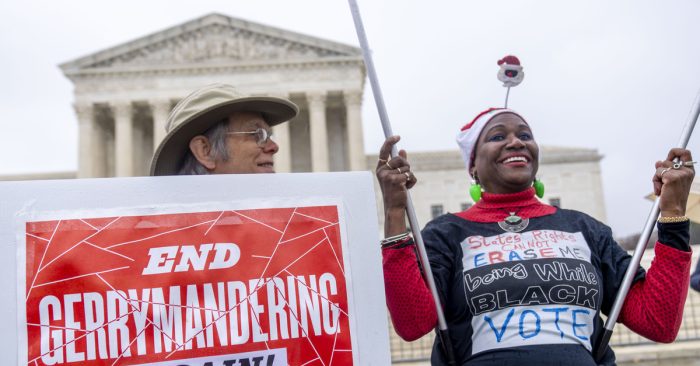Potentially torpedoing a Supreme Court ruling that could overhaul U.S. elections, North Carolina’s Republican-dominated Supreme Court recently took an action that could delay or even upend a reckoning on the so-called “independent state legislature” theory.
In early December, the justices heard marathon oral arguments in Moore v. Harper. Closely followed by court watchers, Moore gives the justices an opportunity to sound off on the “independent state legislature” theory – the concept that under the Constitution, only state legislatures have the power to regulate federal elections, and that state courts may not interfere. The dispute arose out of new congressional districting maps that had been adopted by the state’s GOP-controlled General Assembly to best benefit Republican Party candidates.
The Tar Heel State has a long history of having its gerrymandered districting plans struck down by state and federal courts. In February 2022, the North Carolina Supreme Court ruled that the new plan was discriminatory and must be struck down. In response, Republican legislators led by speaker of the North Carolina House Rep. Tim Moore sued and argued that under the U.S. Constitution, state courts have no authority to second-guess the districting choices of the legislature.
The case is a significant one with serious consequences for the future of U.S. elections. As Justice Elena Kagan put it during oral arguments, the GOP’s position that courts lack the power to strike down gerrymandered districting maps is “a theory with big consequences.”
On Friday, however, North Carolina’s top state court ruled that it would rehear the underlying case. That decision could render the Supreme Court’s decision moot. Decisions to rehear cases are extremely rare, and in this particular case, potentially impactful.
North Carolina’s state constitution authorizes only the state’s general assembly to draw congressional district, excluding the state’s governor. The state Supreme Court had a Democratic majority at the time it ruled that the redistricting was improper, but it now has a Republican majority.
Law Professor Joshua Douglas told the New York Times the move “simply smells of partisanship,” given that it occurred following not a change of law — but one of the court’s composition.
Likewise, election law expert Rick Hasen called the North Carolina court’s decision “curious” in that it essentially deprives the Republican legislators the chance to secure a favorable ruling at the hands of the Supreme Court. Hasen also pointed out that Moore v. Harper provides the justices a vehicle by which decide the fate of the independent state legislature theory in a case that does not challenge a disputed presidential election.
The state court’s ruling to rehear came as the result of a 5-2 vote. The five elected Republican judges were Paul Martin Newby (elected in 2004), Tamara Barringer and Phil Berger, Jr. (both elected in 2020), and Richard Dietz and Trey Allen (both elected in 2022).
Justice Anita Earls, a Democrat elected in 2018, dissented over six pages. Earls, whose dissent was joined by Justice Michael Morgan, a Democrat elected in 2016, wrote:
Not only does today’s display of raw partisanship call into question the impartiality of the courts, but it erodes the notion that the judicial branch has the institutional capacity to be a principled check on legislation that violates constitutional and human rights.
Earls said that while “it is not unusual for the partisan balance of the court to shift,” that the idea of rehearing a case simply because the court’s political composition has changed is an “extraordinary” move that occurred “without justification.”
Earls chastised the court for granting “not one, but two petitions for re-hearing” on Friday, pointing out that “in a single day, the majority has granted more petitions for rehearing than it has over the past twenty years.” The judge said, “There is nothing constitutionally conservative” about the decision to rehear, and that the ruling amounts to a “display of raw partisanship” that “call[s] into question the impartiality of the courts” by relinquishing its right to create a “principled check on legislation that violates constitutional and human rights.”
In addition to the underlying concerns regarding fairness and impartiality, Earls slammed the court’s majority for issuing an order that was “riddled with inaccuracies” on the law applicable to rehearing. Earls noted that none of cases on which the majority relied to support its decision “were decided in this millennium” and none support the “fictitious” rationale used by the majority.
Earls concluded the dissent by calling out the majority for “send[ing] a smoke signal to the public that our decisions are fleeting, and our precedent is only as enduring as the terms of the justices who sit on the bench.”
The judge ended with scathing language:
The majority has cloaked its power grab with a thin veil of mischaracterized legal authorities. I write to make clear that the emperor has no clothes. Because this Court’s decision today is an affront to the jurisprudence of this State and to the citizens it has sworn an oath to serve “impartially,” “without favoritism to anyone or to the State,” I dissent.
Rehearing for the case has been scheduled for March 14, 2023.











